Shows

Around the ACL Cornhole PodcastATA 194: Open #4 Recap, Richards & Smith on a Tear, and Momentum Heading into Signature SeasonThis week on Around the ACL, Meesh, Trey, and Jake recap all the action from Open #4 in Albuquerque where Mark Richards and Tony Smith continued their dominant streak with another statement win in Doubles, and Richards held off rising star Gabe Clausen in an incredible Singles final.
We highlight the biggest movers from Women’s, Seniors, and Juniors, break down which teams are building confidence at the perfect time, and debate who now has the edge going into the first Signature event of the season.
Plus, as always, we close out the show with fresh Ho...
2025-12-0949 min
Around the ACL Cornhole PodcastEp. 183: Throwdown Recap, Celebrity Cornhole, and Season OutlookOn Episode 183 of Around the ACL, Meesh and Trey dive into a packed week of action. We kick things off with a Throwdown recap, highlighting standout performances from Gavin Cano & Sammy Soto in Doubles, Cheyenne Bubenheim & Gina Ramirez in Women’s Doubles, and the powerhouse Crew Cup win from Graham, Davis, Smith, and Richards. Then, we break down the Celebrity Cornhole broadcast where Terry Kirby & Bobby Bowlin came out on top.
Next, we shine the ACL Academy Spotlight on Dave Sutton’s breakdown of the dirty style game, before debating who will finish higher or lower next seas...
2025-08-2650 min
Around the ACL Cornhole PodcastAround The ACL E181: Worlds Recap, Chamberlain’s Hot Streak, and What’s Next for Pro PartnershipsFrom epic Worlds performances to fresh Pro Qualifier talent, this week’s Around the ACL is stacked. Meesh, Trey, and Anthony break down all the action—Mark Richards & Tony Smith taking Words Doubles, Jamie Graham claiming Singles, and Logan Chamberlain’s incredible run across multiple brackets. We highlight standout wins in Women’s, Seniors, and Mixed Doubles, plus reveal the newest names punching their ticket to the Pro Division. In our “Hole-y Hot Take” finale, Trey and Anthony share bold predictions for next year’s Worlds, while Meesh dishes on which Pro partnerships could shake up next season.
Check out The...
2025-08-1349 min
let's THiNK about itPacifism as PathologyIn the latest episode of Let Us Think About It, host Ryder Richards tackles the provocative and polarizing work of Ward Churchill, Pacifism as Pathology. Published in 1986 and later expanded, this essay challenges the sanctity of nonviolent activism, arguing that it not only fails to dismantle oppressive systems but actively reinforces the state’s power. Churchill, a controversial scholar and activist known for his radical critiques of American imperialism and colonialism, wrote this piece out of frustration with the dominance of pacifist tactics in North American progressive movements during the 1980s—a time marked by Reagan’s Cold War polici...
2025-07-0221 min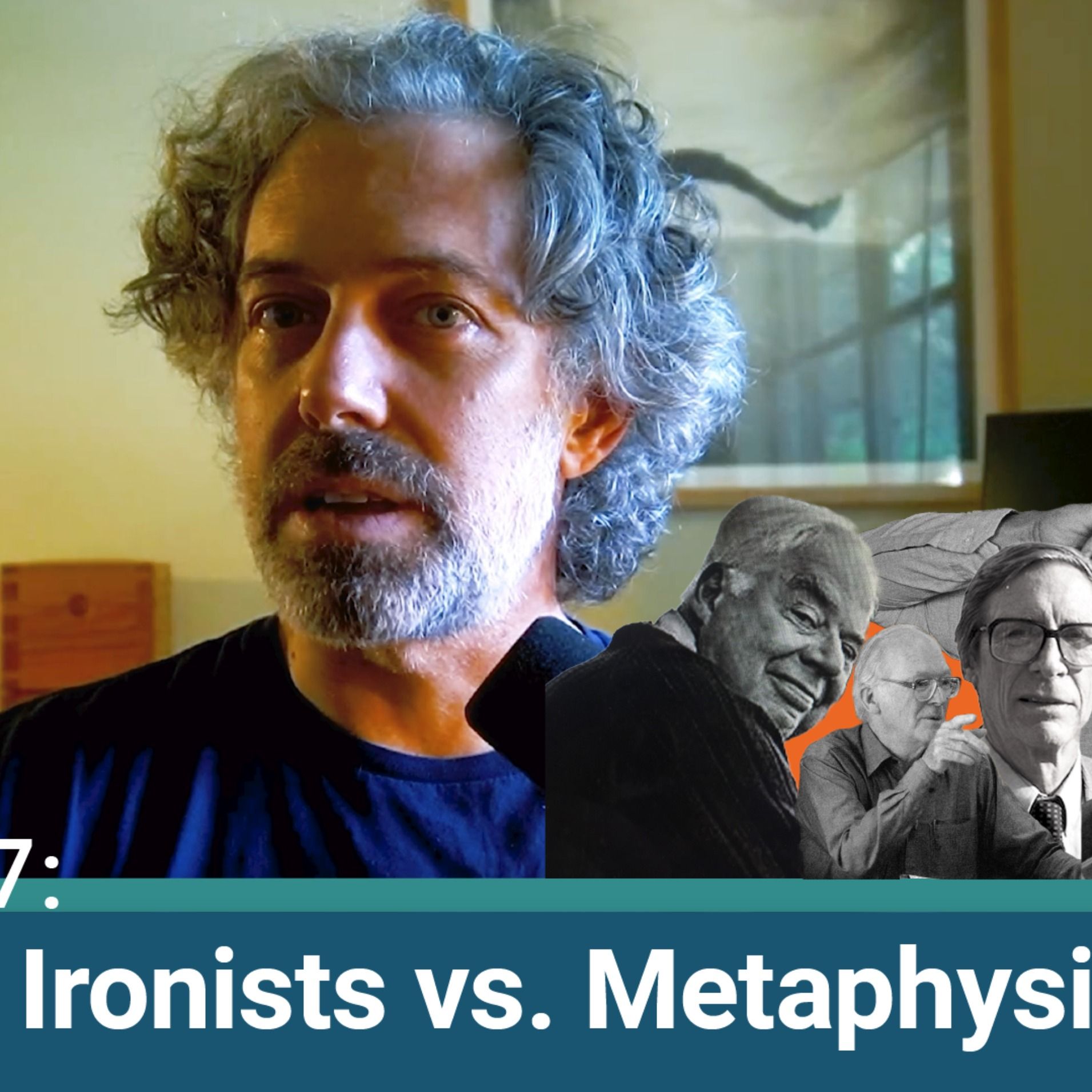
let's THiNK about itRorty’s Ironists vs. Metaphysicians: Navigating Private Doubts and Public HopesIn Step 87 of LetUsThinkAboutIt, host Ryder Richards dives into Part II of Richard Rorty’s Contingency, Irony, and Solidarity (1989), exploring the clash between ironists and metaphysicians. Fresh off recording Step 86, Ryder unpacks Rorty’s seductive vision of the liberal ironist—a figure who privately doubts their beliefs while publicly fighting cruelty, as defined by Judith Shklar’s maxim, “cruelty is the worst thing we do.” Rorty argues language, self, and community are contingent, not grounded in eternal truths, and pits ironists, who redescribe reality with new vocabularies, against metaphysicians, like Plato and Kant, who chase a “final vocabulary” to capture reality’...
2025-06-1720 min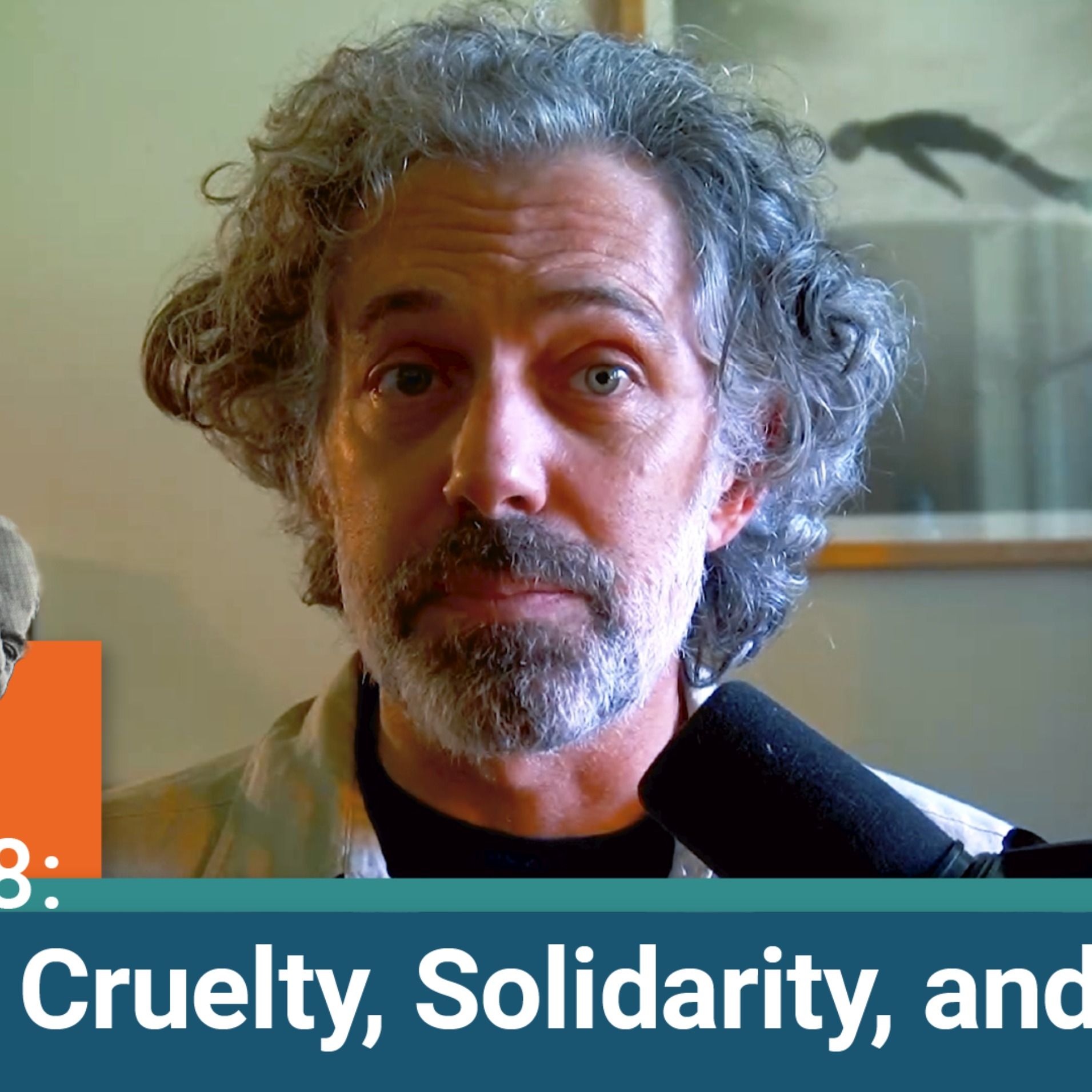
let's THiNK about itRorty’s Cruelty, Solidarity, and Liberal HopeIn "Step 88: Rorty’s Solidarity," the concluding episode of our three-part series on Richard Rorty’s Contingency, Irony, and Solidarity (1989), host Ryder Richards explores Part III, Chapters 7–9, where Rorty tackles cruelty and solidarity. Rorty argues that solidarity isn’t a universal human essence but a contingent creation, forged through imaginative identification with others’ pain via narratives like novels. We delve into vivid examples: Nabokov’s Lolita and its “tingles” of aesthetic bliss, which reveal cruelty through inattention and inspire moral empathy; Orwell’s 1984, where O’Brien’s intelligent cruelty underscores the fragility of liberal hope; and Sellars’ “we-intentions,” showing how solidarity expands “us”...
2025-06-1721 min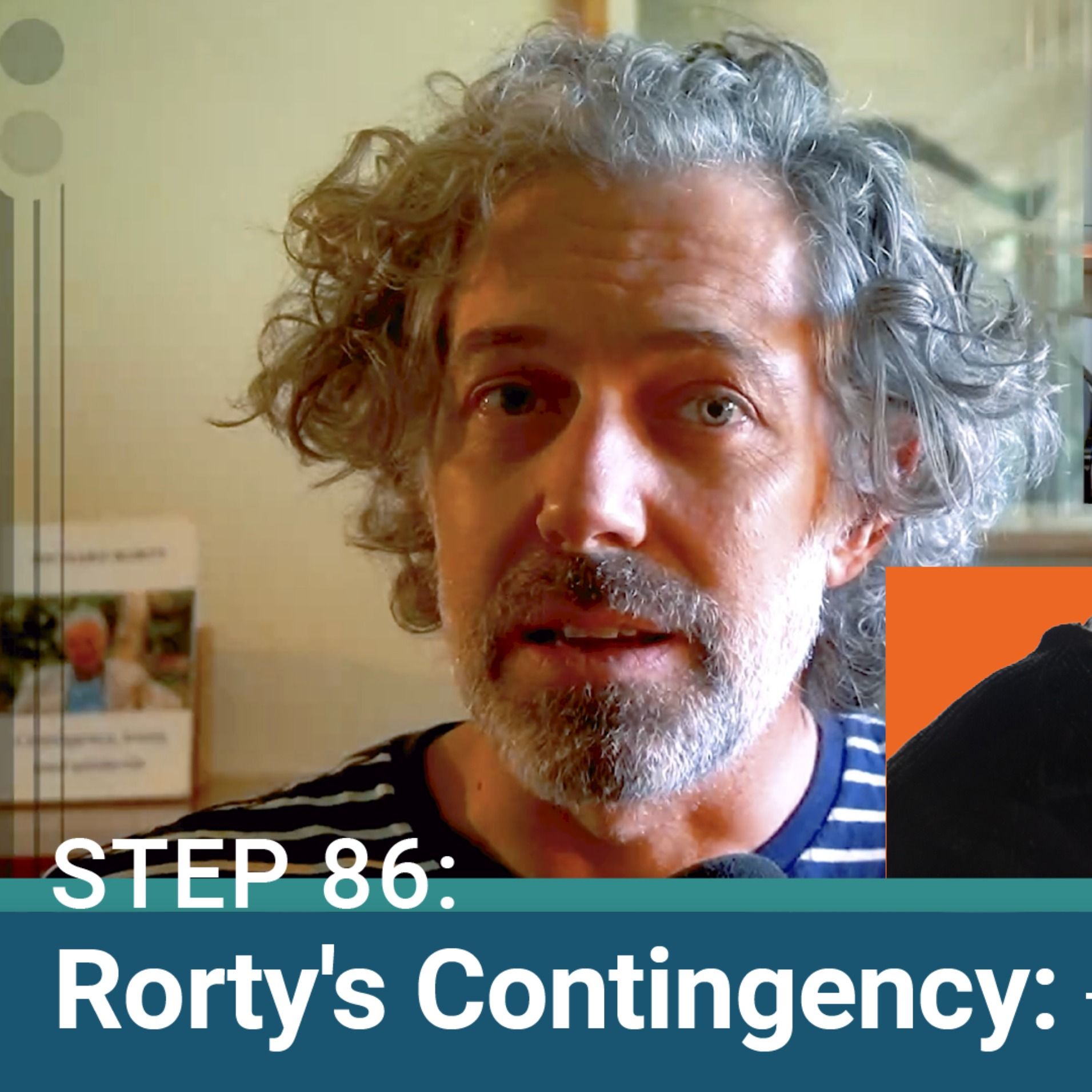
let's THiNK about itRorty's Contingency : Tools, Selves, and CommunitiesIn the first of a three-part series on Richard Rorty’s Contingency, Irony, and Solidarity (1989), Let Us Think About It delves into the concept of contingency. Host Ryder Richards guides listeners through Rorty’s radical argument that language, selfhood, and liberal communities are not grounded in universal truths but are crafted through historical chance, like tools in a dynamic toolkit. Drawing on Chapter 1, Ryder explores how language, far from mirroring reality, builds truths through evolving vocabularies, with examples like the French Revolution and Donald Davidson’s “passing theories.” Chapter 2 reveals the self as a contingent co...
2025-06-1312 min
Boots on the GroundLocation is Everything: How Real Estate Shapes Restaurant SuccessIn this episode, Ryder Richards talks to Brandon Cain, a real estate professional at Retail Specialists with extensive experience in the restaurant industry. They discuss the critical role of real estate in shaping a restaurant's success, from location and co-tenancy to adapting to changes like the COVID-19 pandemic.This conversation provides valuable insights for restaurant owners, aspiring entrepreneurs, and anyone interested in the intersection of real estate and the restaurant industry.1. Introduction and Background (0:00 - 2:53)2. Importance of Location and Co-Tenancy (2:54 - 8:05) 3. Challenges for New Restaurants and Real Estate Economics (8:06 - 15:34)4. Building a C...
2025-06-0636 min
let's THiNK about itThe semantic drift of "good"Ryder Richards discusses the evolution and degradation of the concept of "good" in moral language, referencing Nietzsche, Shell, and McIntyre. Nietzsche argues that "good" originated as a term for nobility but was inverted by the oppressed into a virtue of meekness. Shell suggests that modern morality has been corrupted by utility, aligning with capitalism and democracy. McIntyre claims that modern society suffers from moral fragmentation, rendering ethical discussions incoherent. Richards ties these ideas to Orwell's 1984, emphasizing the structural collapse of language and the futility of moral progress in modern culture wars. He concludes that the concept of "good" has...
2025-02-2108 min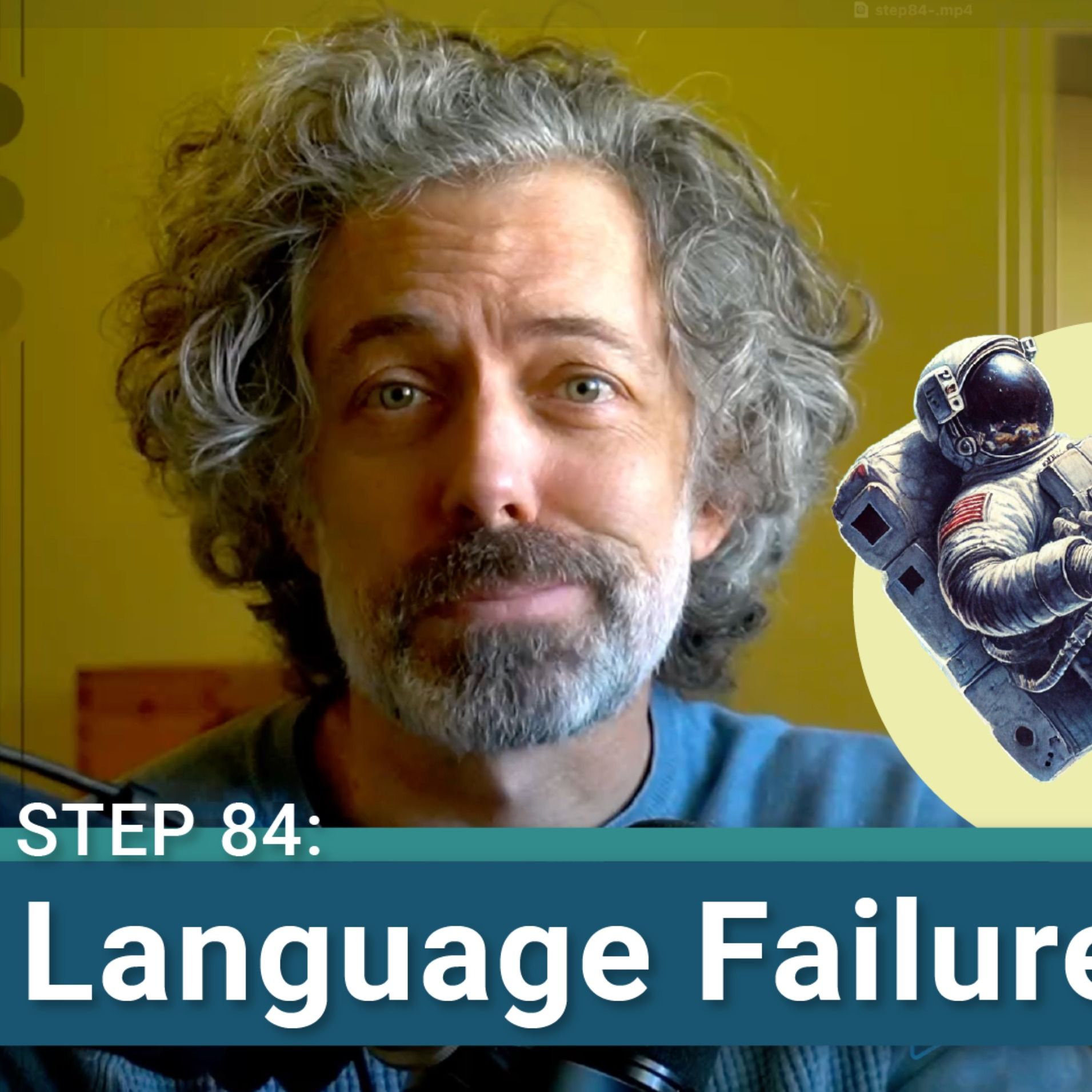
let's THiNK about itLanguage Failure: How Words Shape Our RealityLanguage Failure: How Words Shape Our RealityA Long-Form Summary of the PodcastOpening Hook: The Illusion of RealityImagine walking through downtown San Francisco. On your phone, you see pristine streets and a bustling city. But when you look up, the reality is starkly different—crumbling infrastructure, vacant storefronts, and widespread urban decay. This isn't an episode of Black Mirror; it's what happened in 2023 when San Francisco created a Potemkin village—a facade meant to impress foreign dignitaries while hiding the city’s deeper issues.This phenomenon isn't just about urban...
2025-02-1723 min
Boots on the GroundConvenience vs. Experience: Creating Friction in RetailUncover how leading brands are reimagining physical spaces to reconnect consumers with the joy of discovery and self-expression in retail.Ryder Richards delves into the tension between the convenience of digital shopping and the richness of in-person, experiential shopping. Discover how leading brands are bridging the 'frictionless paradox' and creating immersive experiences that reconnect consumers with the joy of discovery and self-expression. Uncover the psychological implications of AI-driven shopping platforms and the rise of the 'slow shopping' movement. This podcast offers valuable perspectives for retail professionals, marketers, and consumers alike.0:00 Intro0:21 The Frictionless Paradox...
2024-12-0910 min
Boots on the GroundThe Hidden Levers of Downtown RevitalizationRyder Richards and Jenn Gregory discuss the "hidden levers" of downtown revitalization on the Boots on the Ground podcast. Jen, President of Downtown Strategies, shares her extensive experience in community development and policy. They outline five key strategies for downtown revitalization: strategic business mix, enhanced walkability and streetscape, community engagement and events, adaptive reuse and facade improvement, and policy and administration. Jenn emphasizes the importance of incremental progress and the need for a comprehensive approach, highlighting the role of accountability and support in sustaining long-term success. They stress that while each strategy is important, they m...
2024-11-1125 min
Boots on the GroundDecoding Commercial Real Estate Terminology, with Lacy BeasleyIn this conversation, Lacy Beasley, the president of Retail Strategies, helps Ryder Richards, a newcomer to the industry, navigate the complex terminology used in the commercial real estate world. They discuss common phrases and acronyms used to describe properties, restaurant concepts, financing, and the real estate investment process. This discussion provides valuable insights for anyone looking to better understand the language of commercial real estate.https://retailstrategies.com/navigating-commercial-real-estate-terminology/Real estate terminology, including GLA, QSR, and acronyms used in the industry.Lacy Beasley helps Ryder Richards understand commercial real estate...
2024-07-1016 min
Boots on the GroundICSC Vegas Recap (2024)Join Boots on the Ground by Retail Strategies for an in-depth look at the 2024 ICSC Las Vegas Conference. Discover the latest trends in retail real estate, creative deal-making strategies, and insights from industry leaders. Perfect for developers, investors, and municipal leaders. Tune in now! https://retailstrategies.com/icsc-vegas-conference-recap-2024/*Outline*1. Retail real estate industry trends, including creativity and speed in deal-making. Ryder Richards, Elliott Cook, and John Mark Boozer discuss the ICSC Las Vegas show, with a focus on positivity and creativity in deal-making. Guests express optimism about the show's return to normalcy after th...
2024-06-0115 min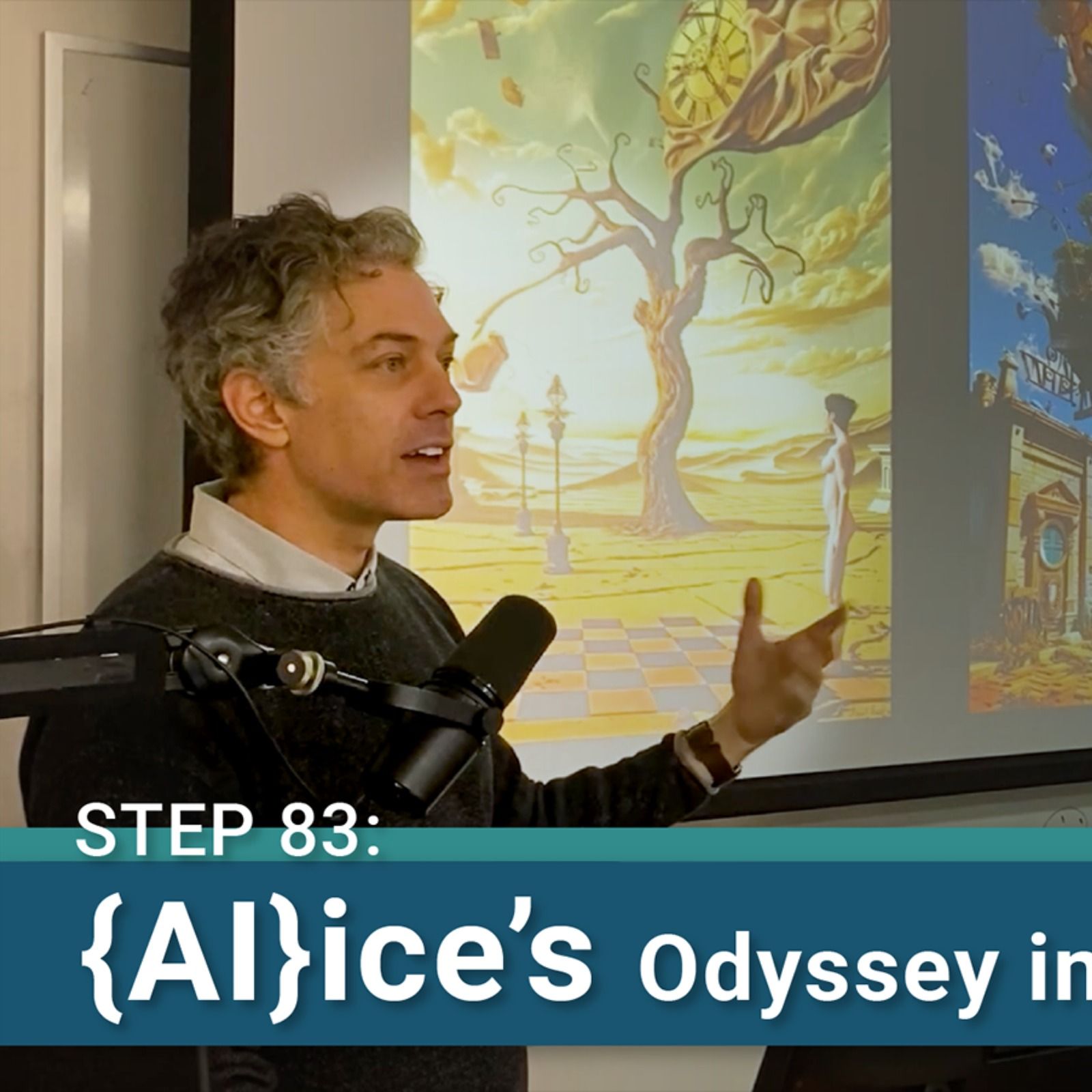
let's THiNK about it{AI}ice's Odyssey in DALL-E LandIn this lecture, Ryder Richards, an artist currently based in Fort Worth, explored the intersection of art and artificial intelligence (AI), specifically focusing on a project that reimagines Salvador Dali's "Alice in Wonderland." Richards delved into public fears and misconceptions about AI, emphasizing a lack of understanding about how AI algorithms function, including generative adversarial networks (GANs) and diffusion models. By showcasing AI-generated images and discussing the differences between various AI platforms like Dolly, Midjourney, and Stable Diffusion, he illustrated AI's capabilities and limitations. Richards highlighted how each platform has its strengths and weaknesses in creating art, the humorous...
2024-03-2641 min
Around the ACL Cornhole PodcastAround the ACL E109Trey, Anthony, and Meesh recap ACL Open #7 in Hamilton, Ohio. Trey shares how Mark Richards and Tony Smith dominated in doubles. Watch Overreaction Monday to find out if the team feels Matt and Brett Guy are back in the top 10 discussion. The team previews Open #8 in Bryan, Texas. They share which players and teams they will be watching. Trey and Anthony award mid-season awards for MVP, Rookie of the Year, Comeback Player of the Year, and Breakout Player of the Year.
2024-01-1649 min
let's THiNK about itArt and AIEssay, Deck and Transcript can be found at https://www.letusthinkaboutit.com/step-82-art-and-ai/The Future of Art and AI: Promises and PerilsArtificial intelligence (AI) has exploded onto the cultural scene, raising pressing questions about the role of technology in art and society. Artist and thinker Ryder Richards recently gave a lecture analyzing AI through a philosophical lens, exploring its potential promises and perils.Understanding AI AdoptionRichards began by taking the pulse of AI adoption, finding about a quarter to a third of attendees actively using AI for c...
2024-01-081h 15
let's THiNK about itKant and the rise of subjective relativismhttps://www.letusthinkaboutit.com/step-81-kant-and-the-rise-of-subjective-realism/Reality, belief, and the apocalypse. 0:00Ryder Richards discusses the demotion of reality in favor of subjectivity, exploring the tension between science and religion, and the consequences of refusing to acknowledge the apocalypse.Kant's false dichotomy between freedom and determinism is questioned, with a focus on the historical context of Thomas Hobbes and Galileo's views on a mechanical reality.Kant's philosophy and its impact on understanding reality. 4:10Kant introduces philosophy that squares God observation conundrum.Kant argues that objects in reality interfere with self-governance, leading to a moral argument...
2023-12-2626 min
let's THiNK about itTranscendent EscapismIn this episode of Let's Think About It, host Ryder Richards examines the relationship between truth, reality, and abstraction. He proposes reality filters profound ideologies like religion and science, which rely on belief, from superficial falsehoods like marketing propaganda that obscure reality. Richards argues both sides undermine truth, but marketing inflames desire and bypasses reality altogether. Using quantum physics and art as examples, he shows how we use weighty abstractions to escape reality's limits. Ultimately, Richards says our tendency is to use fantasy to disregard reality, envisioning catastrophe to then deny it through rigid universal rules that validate our...
2023-11-1822 min
Around the ACL Cornhole PodcastAround the ACL E102Trey, Anthony, and Meesh recap Open #3 in Tiverton, Rhode Island. Trey emphasizes the incredible success Mark Richards had in singles. Meesh shares the winners from the Carolina Conference event, Mid South Conference event, and the Badgerland Regional. The team previews Open #4 in Memphis. They tell us which players they will be watching. Make sure to watch the Contender or Pretender segment to find out which pro players they believe will win a pro bracket this season in singles.
2023-11-1449 min
let's THiNK about itSkipping RealityRyder Richards builds on thinkers like Kant, Rorty, and Baudrillard in this podcast to argue that reality can filter problematic abstractions. He proposes reality as a net separating transcendental truths and superficial advertising. Without reality's grounding, these abstractions reinforce each other's weaknesses.Part 1 - Reality as a Net for AbstractionsRichards lays out the idea of reality as a net dividing two types of abstraction. On one side is a transcendental ideology or truth claim, such as religion or science. On the other is superficial simulacra like advertising. Usually, reality forces these to grapple with...
2023-10-2317 min
let's THiNK about itThe Parallax Viewhttps://www.letusthinkaboutit.com/step-78-the-parallax-view/Ryder discusses the concept of Slavoj Zizek's "The Parallax View" in three parts.Part 1: Ryder defines the parallax view as the convergence of seemingly parallel perspectives. He draws a connection to optical illusions of perspective and discusses how the parallax view involves looking beyond the central focus point. The author also touches on its use in astronomy.Part 2: Ryder discusses Slavoj Žižek's use of the parallax view in his book and how it reconsiders the traditional Hegelian dialectic of synthesis or sublation. He explains how Žižek's...
2023-09-1722 min
let's THiNK about itPerspective FramingWelcome to the problematic realm of perspective framing. Ryder Richards will be your dubious guide through this profound exploration of self-awareness and understanding. Central to our journey is the parallax view, a powerful method of finding our place in the world by establishing reference points by Slavoj Zizek. But first, we must challenge hegemonic narratives and reconsider Hegel’s notion of negation, as breaking free from (or subsuming and overcoming) conventional beliefs allows us to envision new possibilities.As we progress, we’ll examine how psychology analysis, meditation, and Buddhism provide tools to reshape our perspectives and alle...
2023-07-3021 min
let's THiNK about itConcrete Universal (trash and art)🗑️ Garbage represents the concrete universal of waste.🎨 Picasso's art exemplifies the concrete universal through different periods and works.🌌 Failures and contradictions can lead to transcendence.🎭 Art expresses both expression and concealment simultaneously.🔀 Concrete universalism combines the concrete and the abstract into one concept.💡 The concept of concrete universalism challenges fixed definitions and highlights the dynamic nature of objects, people, and ideas.🔄 The concrete universal constantly expands, while the defining object fails to fully capture its totality. ---- TIMING/CHAPTERS----0:00 Welcome back to the show.Fiction...
2023-06-2916 min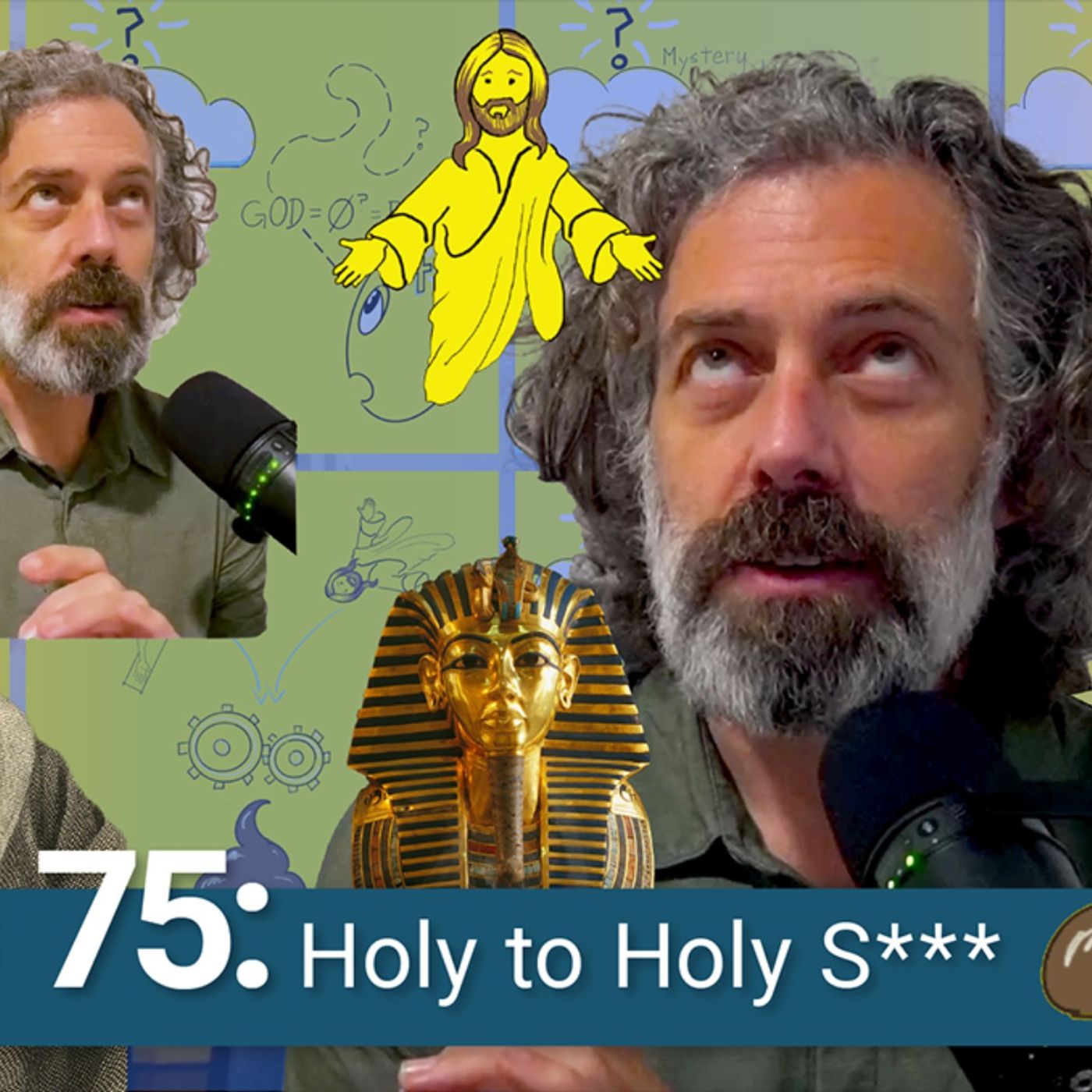
let's THiNK about itholy to holy s***Christianity operates through a lack: we cannot know God, so a “gap” must be filled between God and Humans. Christ is God splitting from 1 into 2, allowing us to identify and get closer to the mystery of God, but in so doing, Christ was subjected to the filth of this world. (Zizek) The reversal of the one God splitting into two (only to mysteriously re-unify us) is the process of poop: taking all values and reducing them into one homogenous, non-mysterious pile. (Bataille) Growth can occur from this filth (otherwise known as manure), producing roses. Beauty from s...
2023-05-2617 min
let's THiNK about itSymbolic Victory0:00 The contradictory injunction of double binds.• The contradictory injunction in double binds.• The binary trap in cyberpunk. 2:15 The death drive of determinism.• The death drive of determinism.• How to transcend the binary. 4:44 How the capitalist system capitalizes on our stress.• The capitalist system surprisingly capitalizes on stress.• The anxious revolt is fuel for the bureaucratic nightmare. 6:33 Intro to the show.• America and political symbolic winning, and camouflage.• The wild west of America.
2023-05-2123 min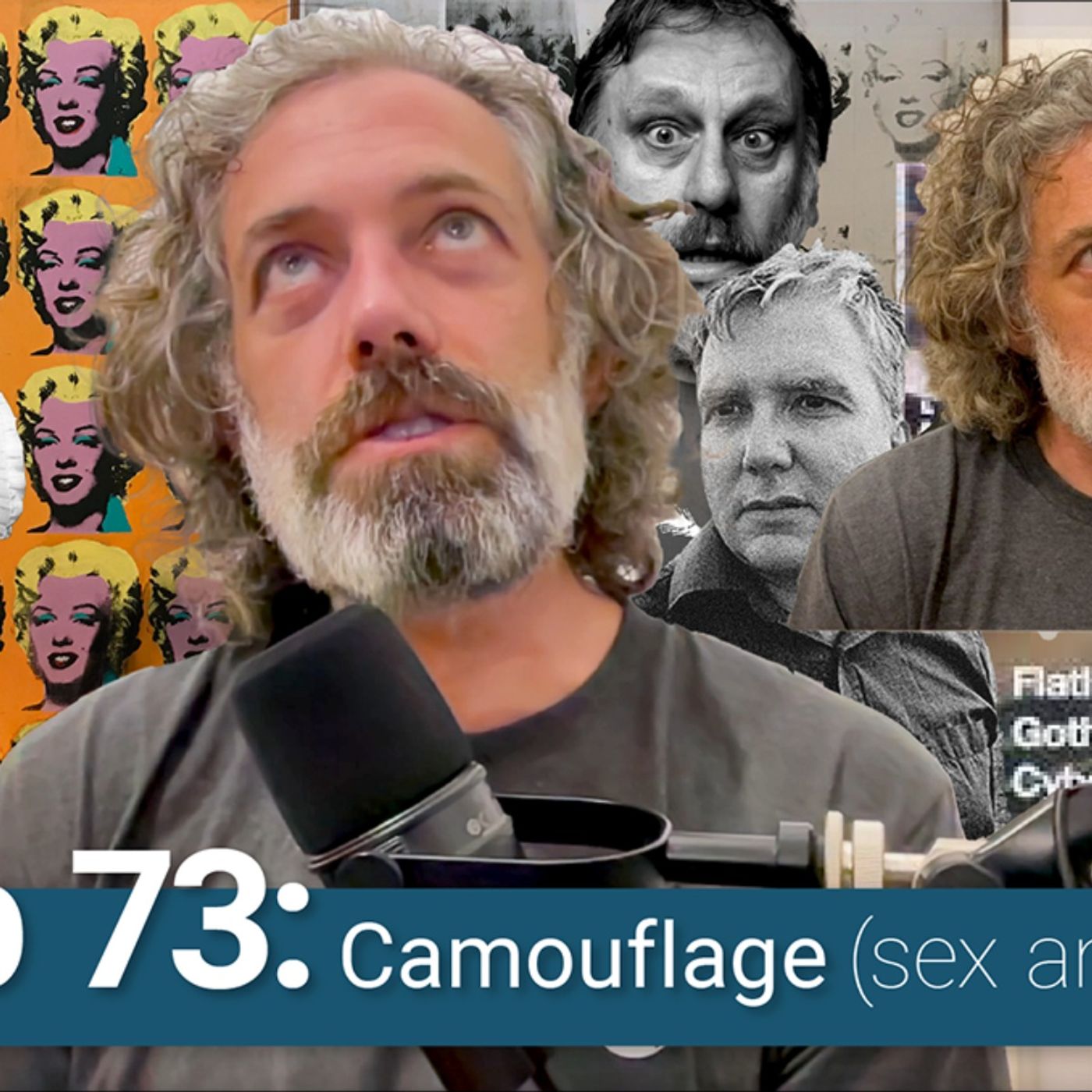
let's THiNK about itCamouflage (sex and trust)0:01 Why camouflage is like a rhizome.The complexity of camouflage and abstraction.Why camouflage is a better survival strategy.2:44 The servant as master.How to become low like water and remain powerful.Master as servant - martyr. 5:16 The boss who tries to also be your best friend.The parent who guilts you. Undermined core self: camouflage needed for shame concealment. 6:56 The ubiquity of repetition and mass media.The ubiquity of marilyn monroe as a sex symbol. (Andy Warhol)Society normalization disperses desire: at once object and landscape. 9:18 Desire has become decentralized and...
2023-04-2521 min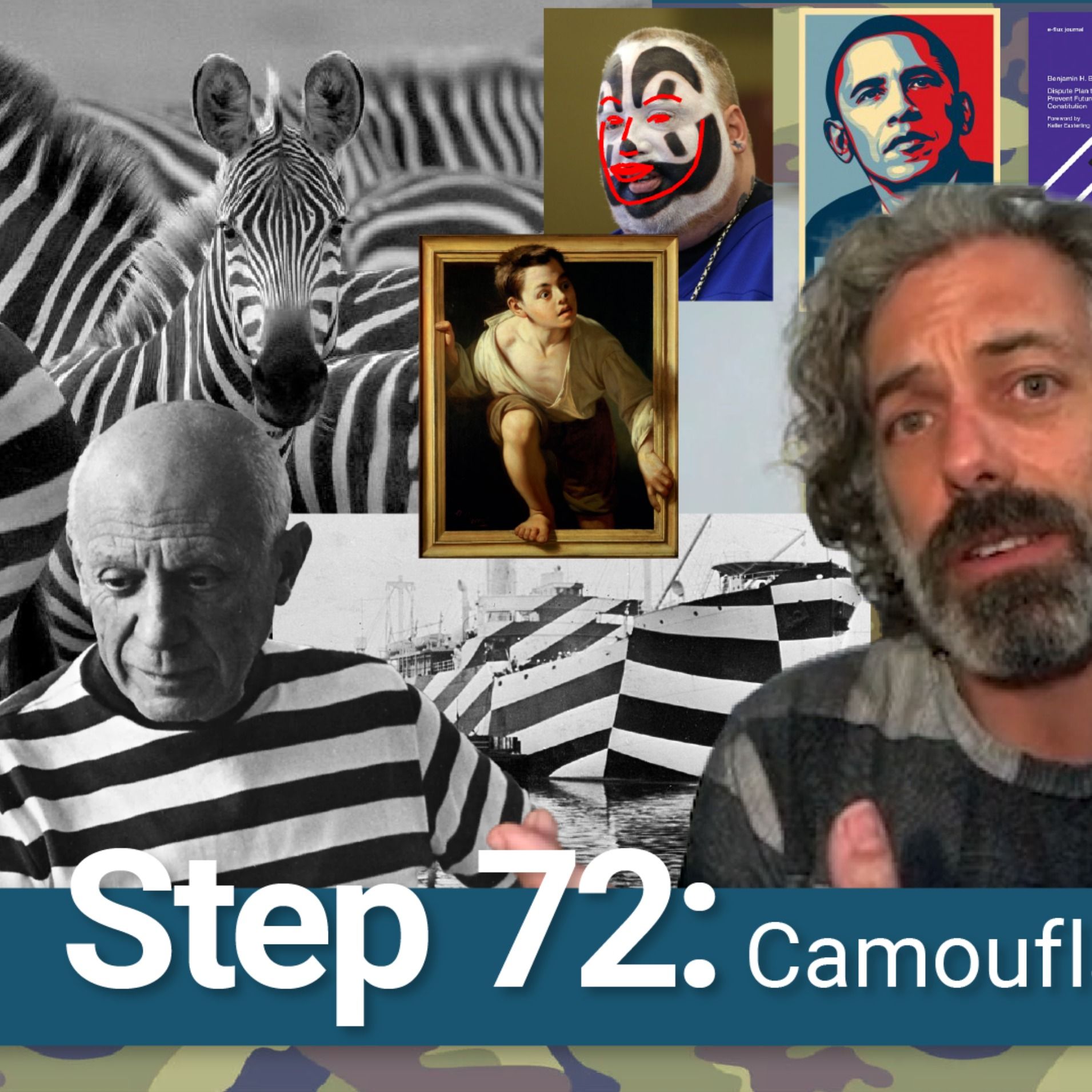
let's THiNK about itCamouflage (and Art)Introduction - Recap of previous episodes on the mimetic desire.- Rene Girard's model of scapegoating.2:33 How do we prevent mimetic desire?- One way to solve mimetic desire and scapegoating.- The dispute plan to prevent future luxury.4:42 What do you do after the revolution?- Government ineptitude and bureaucracy is what the people actually want.- What to do after the revolution, or after the orgy.- The French army became the first to create a dedicated camouflage unit.
2023-04-2133 min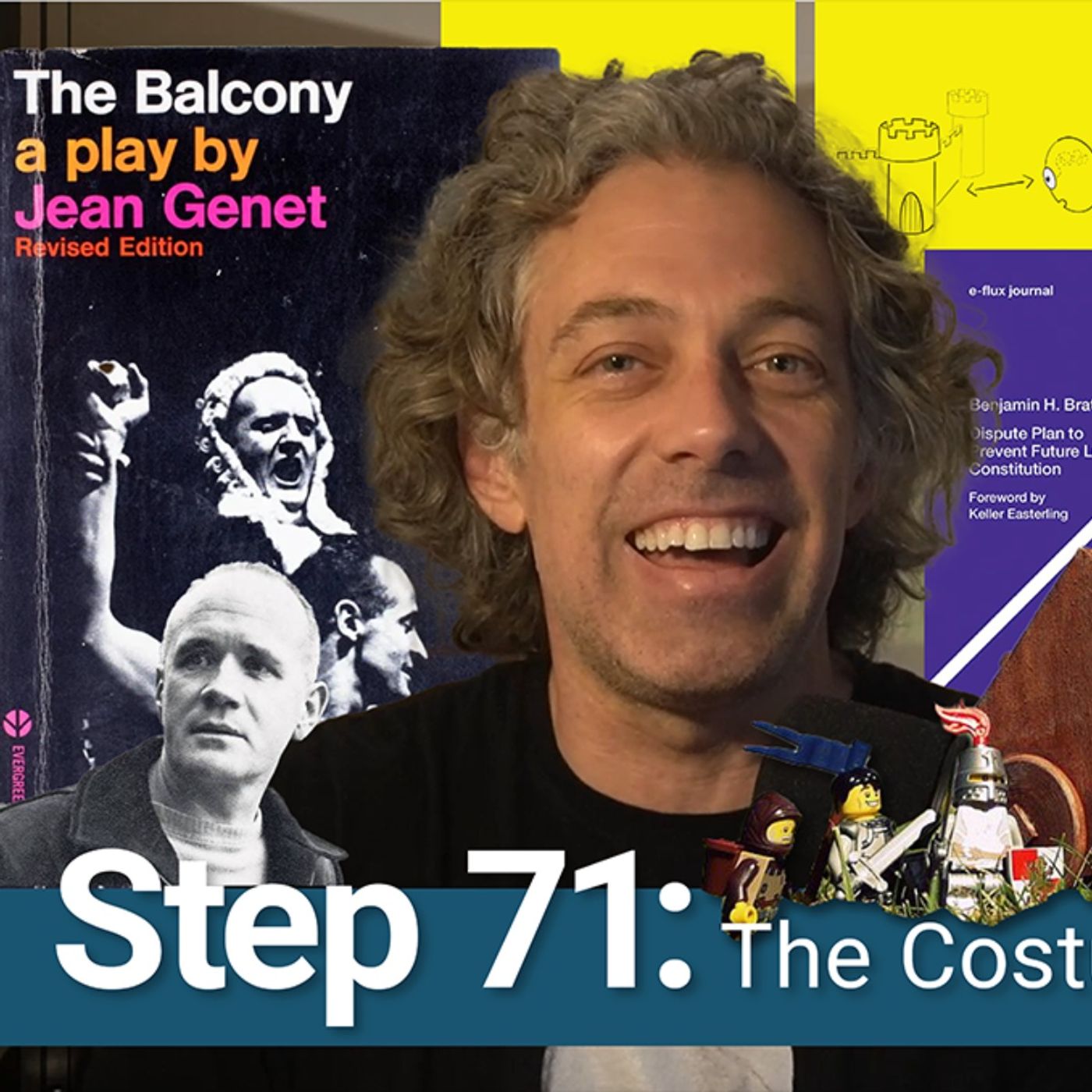
let's THiNK about itThe Costume & Inscribed Violence0:00 How violence is provoked by fantasy.2:31 The balcony and the revolution.5:14 How far does mimetic desire go?6:54 Most things happen twice: the story, then reality9:41 Post-terrorist architecture.12:40 Turning the desire into a blueprint (simulation to be de-simulated) 14:37 Recognize that the world is f***ed.16:43 The parable of Bill Clinton or George W. Bush.18:55 The desire to be the simulacra of man. (oh, to be a machine)21:43 The black mirror of capitalism. (Amazon and the state)
2023-02-2825 min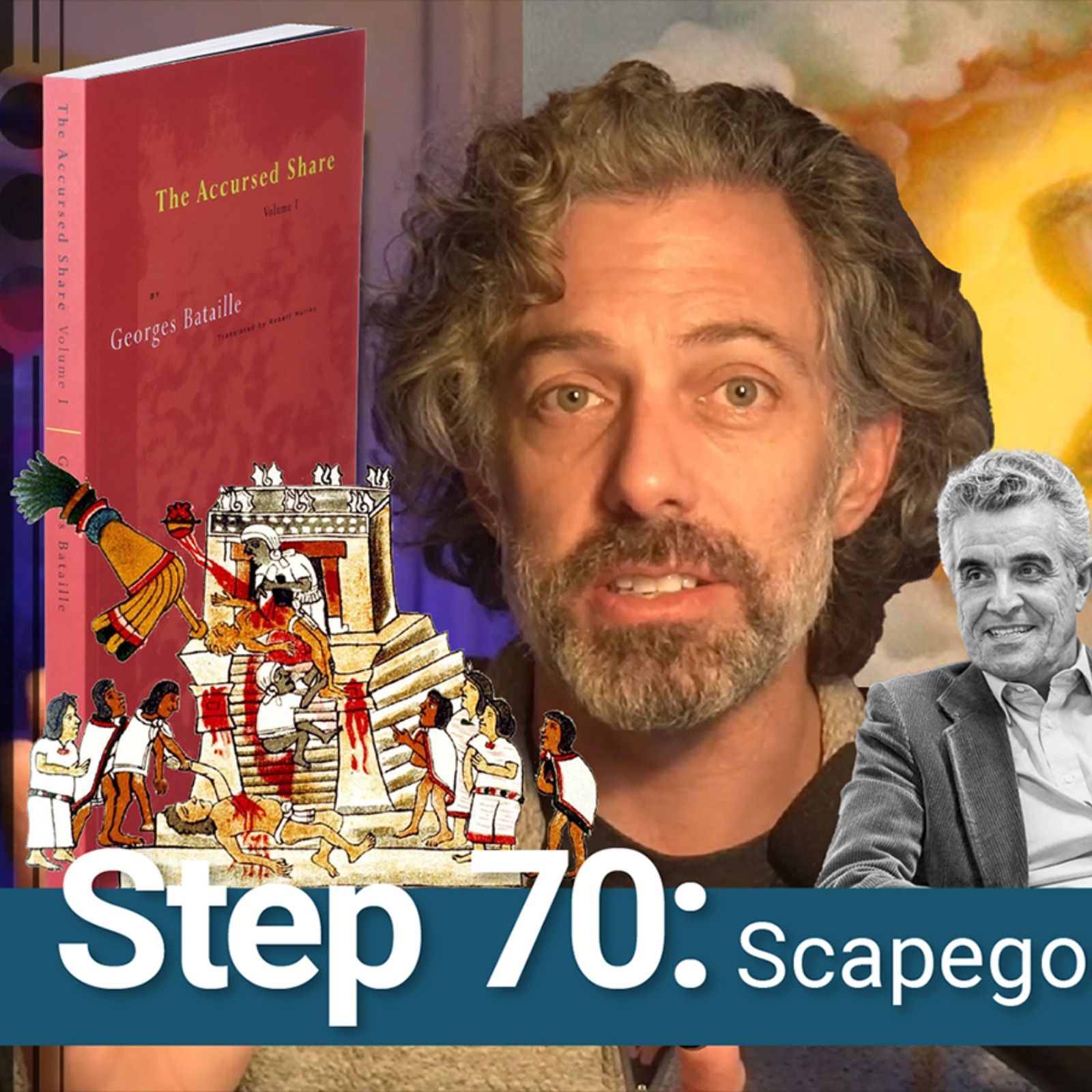
let's THiNK about itScapegoating & SacrificeReversing inner pressure outward requires a scapegoat to sacrifice in order to stabilize society. By discovering the hidden models driving it reveals our motivations, but more importantly, Rene Girard‘s theory accounts for civilizations' cybernetic energies and release valves. Paired with Georges Bataille’s theory of sacrifice necessary due to excess (the general economy) we find explanations for seemingly irrational behavior. Drawing from Luke Burgis's "Wanting: Memetic Desire in Everyday Life" we look at the basics of memetic rivalry, hidden models, and mediators before jumping to scapegoating, then we move into Lacan's notion of the "objet petit a" to...
2023-01-2931 min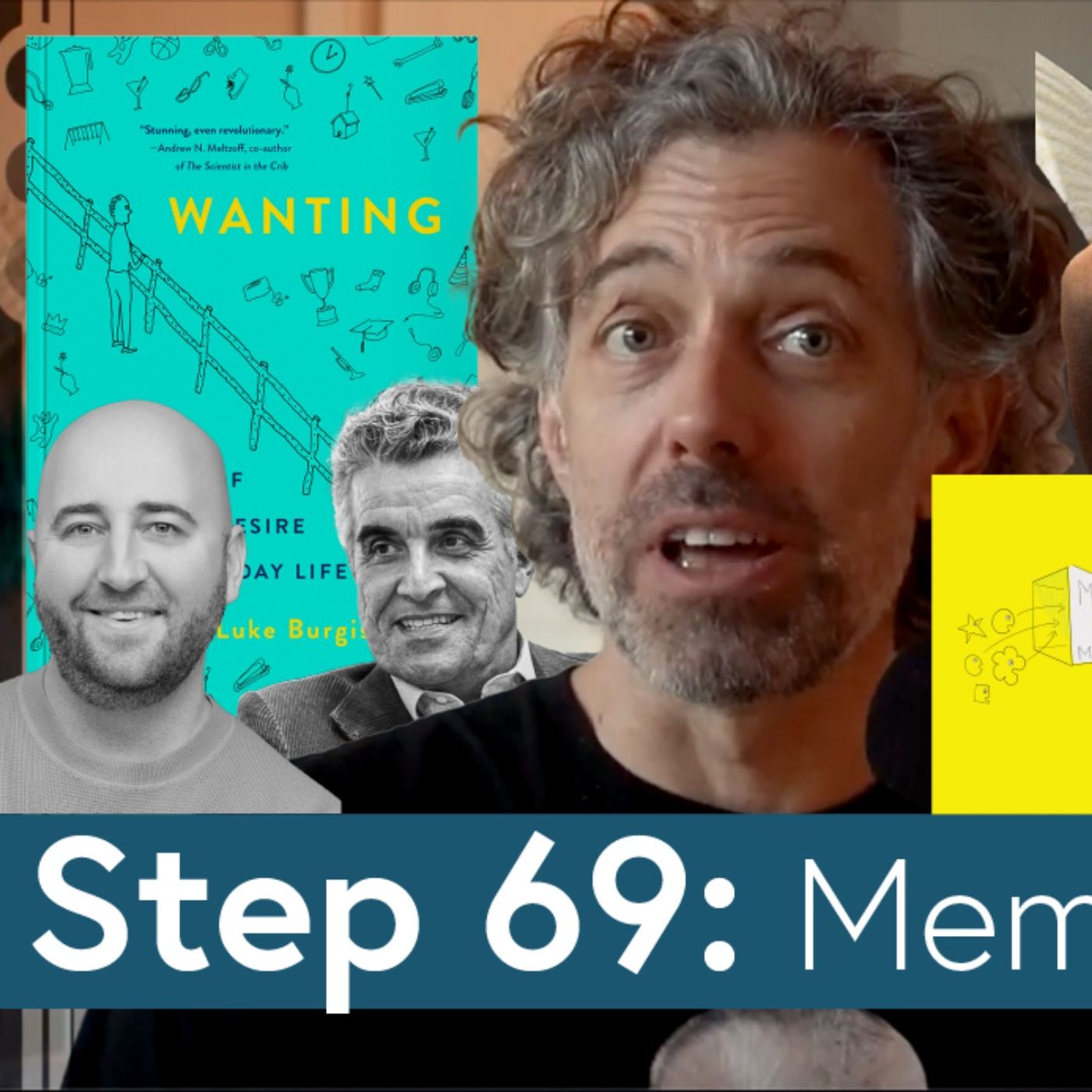
let's THiNK about itMimetic Desirehttps://www.letusthinkaboutit.com/step-69-memetic-desire/ 0:00 Intro1:22 What is mimetic rivalry? memtic desire.2:48 Mimicry as an internal set of neurosis.5:05 What we want is the attention and control that someone else wanted first.7:14 If somebody else wants something, our survival depends on us getting to it first.9:47 Shakespeare’s Romeo and Juliet.11:28 Accelerationism is a means to break out of the deadlock of capitalism.12:56 All of our focus is now embodied in winning the object.14:46 If the system is goo...
2022-12-2418 min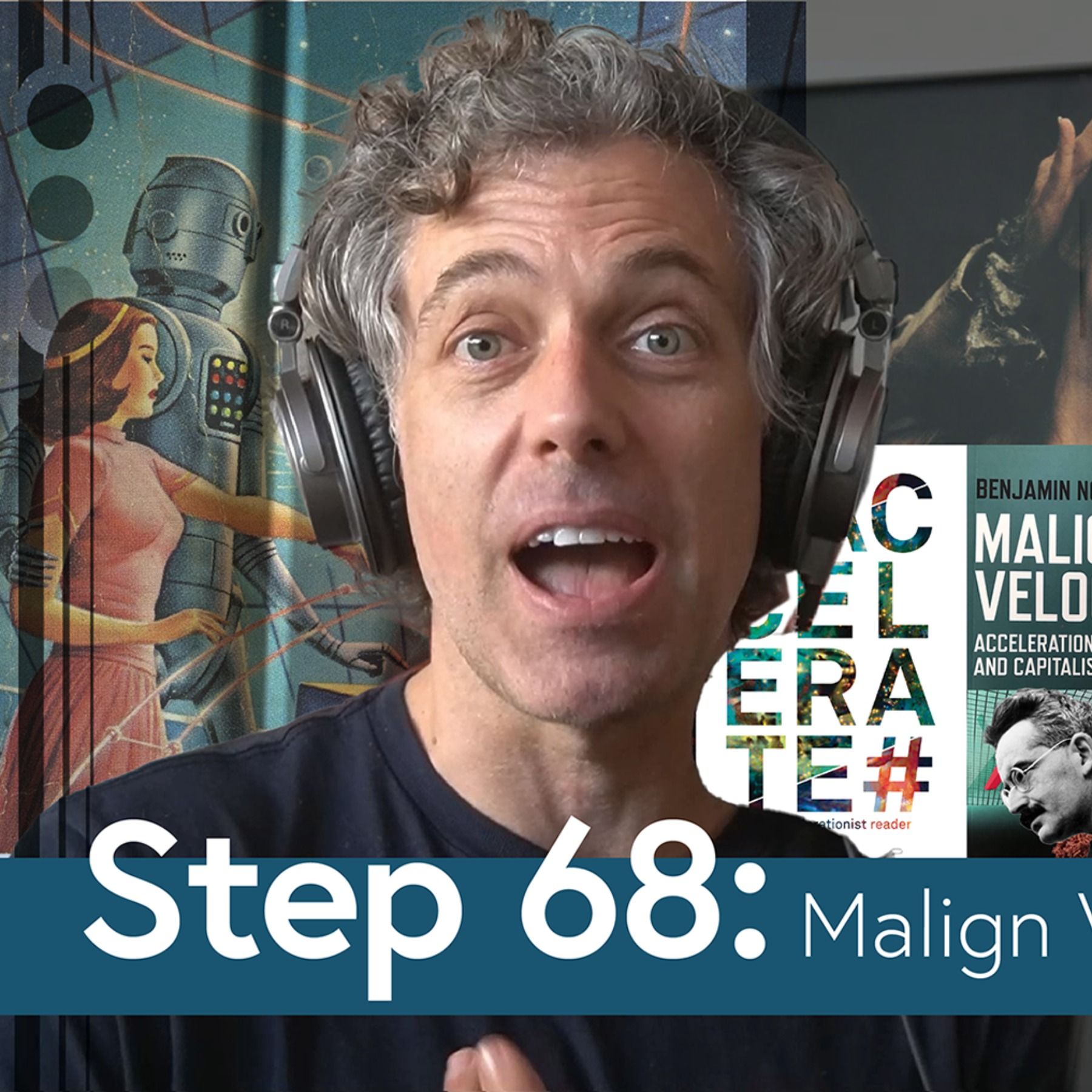
let's THiNK about itMalign Velocities (Accelerationism) 0:00 Introduction to this episode.1:53 In 1879 there was a horrible train wreck: the promise and cost of technology4:27 A cautionary tale about the influence of the machine on communism.6:53 What is the frame of Capitalism? (Marxism into desire) 12:17 The problem with capitalism is not just the machinery, but also our social and libidinal economy.15:04 Our desires are shaped by society, work, and culture, which are not easily overthrown altogether. 17:52 How do you manifest the spirit of man at his boldest while denying him his rude desires?
2022-12-1033 min
let's THiNK about itAccelerationism & Futurism0:00 Intro _ the Gods of Technology (Deus ex Machina) 3:56 Part 1: some context _ the capitalist trap, double binds, and looking for an escape, reality vs. abstraction11:27 Part 2: the futurists_ from industrialization to deregulation to cyberspace, 1909 manifesto, praise machines and war, but scorn for women17:41 Part 3: the accelerationists _ the 2008 crash, bailout, failures and no foreseeable changes, humans slow down tech progress, we have lost imagination and are dying anyway23:33 Part 4: the death drive and the implications, breaking the machine, following capital 29:54 Outro _ next episode on Malign Velocities by Benjamin Noys
2022-11-0731 min
let's THiNK about itCybernetics & CapitalismFull episode in writing as well as video at:https://www.letusthinkaboutit.com/step-66-cybernetics--capitalism/0:00 Intro 1:56 Part 1: cybernetics _ machines, feedback, and cascades 6:22 Part 2: one-dimension of capital _ Marcuse, consumerism’s false needs, subjecting justice to capitalism9:55 Part 3: deterritorialization _ Deleuze and Guattari, positive/negative energy, decoding the regulation valves14:00 Part 4: reterritorialization _ Mark Fisher, immediate recapture, mark fisher, refusal as lack of feedback 23:26 Outro
2022-09-2424 min
let's THiNK about itThe Path of Opposition (Failure as Transcendence)PART 1: the path for the 2 to become 1the 2 is 1, linked through exclusionin the last season of “peaky blinders” Tommy Shelby is a socialist forced into plotting with the fascists… In one scene he says people think of opposing sides as two end-points as if they are on separate tracks. But Tommy says he finds it to be a circle, where the two sides start diverging. As they escalate and become more extreme, separating distance, they begin to arch back toward each other, sweeping around the central axis, as if in an orbit. As...
2022-08-3123 min
let's THiNK about itArtificial Negativity & Repressive Tolerancehttps://www.letusthinkaboutit.com/step-64-artificial-negativity--repressive-tolerancePart 1: Hegel, antithesis and sublation, the spiral, and the ground. Part 2: Paul Piccone & TelosPiccone was the editor of Telos, a journal. After being disenchanted by the "exhaustion of the left" he drifted from a Marxist/Hegel leaning ideology to embrace the ideas of the right, through the more totalizing illiberal Carl Schmitt. Artificial Negativity (Piccone and Lake) asserts the Herbert Marcuse's idea of the one-dimensional man was the final control necessary for totalizing control through consumerism. The elites allow for negativity because any system has...
2022-07-2718 min
let's THiNK about itThe One-Dimensional Man https://www.letusthinkaboutit.com/step-63-the-one-dimensional-man Part 1: Captialism absorbs everything: even your rebellion against it becomes a published book, which feeds capitalism, and generates pro-capitalists books. In a dynamic system, each tactic has a counter, and this generates (cleverly) more capitalism. A famous example is of Che Guevara’s rebellion sold as a cheap t-shirt: a purchasable identity of rebellion. Part 2: The On-dimensional man is a book by Herbert Marcuse in the mid-60’s about our wealthy industrial nation orienting citizens into consumerism by developing “false needs” which we pursue. This drains our energy for cognitive a...
2022-07-1711 min
let's THiNK about itThe Double Bindhttps://www.letusthinkaboutit.com/step-62-the-double-bind/PART 1Ryder discusses Alan Watt's interpretation of the "tough-minded" and "tender-hearted" as "prickles and goos" that need each other, yet are confused by each other and lash out. Of course, like Alice in Wonderland, we can refuse to play the game: the competitive rules laid out by another in a grid, but Watts says to remember that life is a game... when our ego gets involved we tend to forget and become serious and demand "off with their heads." Using Buddhist insights may not help. It...
2022-07-0614 min
let's THiNK about itEscape from Freedom (pt 2)Why would anyone want to escape from Freedom?Psychologically freedom is a tremendous burden, especially in a competitive society commoditizing your individuality. Erich Fromm in “Escape from Freedom” maps out three means to escape the anxiety, isolation, and doubt of the Modern Age: Sadomasochism (aka authoritarianism), Destruction, and Automaton Conformity.The burden to be uniquely you within a society demanding submission or conformity leads people to want freedom, and one response is “negative freedom” which is like a man on an island, free from external restraint, governments, or social life. However, if his goal in life is...
2022-06-1820 min
let's THiNK about itEscape from Freedom (pt 1)Why would anyone want to escape from Freedom? Well, in a complex system, any move will produce countermanding forces, and humans are slow-evolving creatures, and by merely shouting “you are free” we encounter some problems: 1) now what? and 2) it doesn’t line up with the reality of working every day and still falling behind.While freedom is held up as an ideological holy grail, the reality on the ground is different: People do want to escape from freedom because having to “know who you are” is a tremendous strain when you are supposed to be an “authentic autonomous i...
2022-06-1224 min
let's THiNK about itGambling, the Death Drive, & Libertarian NeutralityGambling has grown, as has gambling addiction. With technology improvements driven by behavioral science, gambling is more addictive than ever. While it may be your choice to gamble, the cards are stacked against you, and more gambling addicts commit suicide than any other addiction group.Exactly how do we get addicted, why do we begin gambling in the first place, and if it is a flaw in our society why do we persist in thinking of it as a personal psychological failure? How does our culture’s decree to find your “individual freedom” lead to a circumstance where...
2022-05-1734 min
let's THiNK about itIdentity and ViolenceOur identity is multifaceted, but people love the simplicity and tend to reduce people to a singular trait, which objectifies them. This reduction leads to violence, in part because it allows an "us vs them" narrative. Amartya Sen points out the ramifications in his book "Identity and Violence". To consider it personally, we look at Martin Buber's "I-thou" to show how most of the time we are in an "I-it" relationship to the world, and must "self-surrender" to have an "I-thou" whole relationship, and not objectify others. Ryder closes out with David Foster Wallace's "This Is...
2022-04-2618 min
let's THiNK about itDesign facilitates AgencyStep 57: Design facilitates AgencyPart 1: The MouskedoerCrawford tells this story about watching the Mickey Mouse channel, and on the show they have these segments where, say, 4 objects are in a grid, and a river shows up on the screen. Do you use the bridge, the ladder, the hammer, or the banana to cross the river? Did you guess banana? That’s a common mistake. Smart mouses ask for help! Let’s do it on 3, 1,2, 3… it starts with a br and ends with an idge. And if you get all 4 you are declare...
2022-04-1532 min
let's THiNK about itIntegrating Embodied PerceptionIntroToday we continue considering “the world inside of our head” as quite narrow versus “the world of your body”, pulling heavily from Matthew Crawford, but also Iris Murdoch and Iain McGilchrist.We are going to look a bit at the mind/body split that became the “my self is the voices in my head” problem. And hopefully cast some doubt on the intellect as a lone arbiter for decisions, and reintegrate the right brain and body. This is difficult because at our most foundational (linguistic) attitudes we consider the self as the intellect: Alan Watts says w...
2022-04-0128 min
let's THiNK about itCultural JigsPart 1: Jggy wit itI personally do a lot of woodworking, making cabinets or entertainment centers, I'm currently trying to build a window. I have tools that help me, such as a table saw is great, but sometimes there is a finicky cut in a difficult spot and you need a handsaw. The hand saw has a downside to it: I'm not skillful enough or experienced enough to make sure it cuts it a perfect 90° angle while staying parallel to the edge and lined up on my marks. One trick is to clamp another board on...
2022-02-2720 min
let's THiNK about itThe World Beyond Your Head (pt 2)SHOW NOTES at https://www.letusthinkaboutit.com/step-54-the-world-beyond-your-head-pt-2/0:00 intro2:11 part 1: environmental suppression5:31 part 2: the illusion of the self8:35 part 3: situated self & ecologies of attention11:17 part 4: autonomy vs heteronomy14:33 part 5: the current cultural narrative19:16 part 6: freedom!21:16 part 7: the ideal self as projection
2022-02-0625 min
let's THiNK about itThe World Beyond Your Head (pt 1)1: Attention as a cultural problem“Capitalism has gotten hip to the fact that for all our talk of an information economy, but we really have is an attentional economy, if the term economy applies what is scarce and therefore valuable.”Matthew CrawfordCrawford goes further because if capitalist corporations seek our attention, the easy way to get it is to stimulate us: to poke and prod our attention centers. To say fully present and to own our own attention we must apply tremendous effort.“The contents of the stimulation almost becomes irrele...
2022-01-2930 min
let's THiNK about itBest of 2021 (book review)Ryder consumed over 50 books and about 200 podcasts in 2021. Walking through concepts of the origins of bureaucracy and how the protestant work ethic shaped corporations and consumer behavior, he moves into healthcare related to liberty, how to solve many problems on our way to utopia, and a model for transitioning away from capitalism into a nature-based economics.https://www.letusthinkaboutit.com/step-52-best-of-2021-review-by-books/My two favorite books“Moral Mazes” and “The Culture of the New Capitalism“Both of these are sociology books about how the world has changed. They both reference Max Webe...
2021-12-3020 min
let's THiNK about itAmbiguity (self-optimization pt. 4)The most obvious problem with optimization is "who (or what) are you optimizing into?" First you must know yourself, then have a mission with little goals along the way allowing you to hack productivity. But if you are in a rush to gain career capital for survival or to earn freedom, your mission is likely not your own, thus requiring disciplined willpower to pursue. This opens us to problems with willpower and subjective truth shaped objective relations. More problematically, optimization reduces for efficiency, in which case there may be no space left for the messy ambiguity of the human...
2021-12-0530 min
let's THiNK about itThe Hero TrendencyThe Hero Story Perhaps there has always been an effort towards optimization, and it generally looks like technology. When speaking of self optimization, or overcoming , we are speaking of the hero’s journey popularized by Joseph Campbell. Campbell spoke a lot of the parallels of the external journey and the internal journey… the external circumstances gave the individual the opportunity to react and grow.In the 50’s-70’s there was a wave of belief in unlocking human potential through psycho-science-type things like intensive practice hypnosis and subliminal training… or just LSD. Some of these practices were previous...
2021-11-1827 min
let's THiNK about itAtomic Habits (optimization pt 2)Part 1: The Aggregation of Marginal GainsHabits are really about identity change. Behaviour change is simply the means to get there (the feedback loop).What are atomic habits? They are the smallest possible habits, tiny little things that you can begin doing easily for remarkable changes.Example: The British cycling team wasn’t doing so well until their new coach, Dave Brailsford, implemented very small, incremental changes: things like trying out different tires or massage lotions to increase recovery time.They did not see immediate results, but the gains accumulate over ti...
2021-10-2025 min
let's THiNK about itSelf-Optimization Lure (part 1)Series overviewThere is a mystical power to self optimization, to becoming better. With all the Behavioral Science, behavioral economics, psychology, neurological studies, and FMRI tech we have figured out how to make you “better.” Yet, according to movies and myth, attempts at control or better living through science cascade into tragedy.From the 80’s man now considered toxic, to the perfect housewife now considered repressive, the timing of the societal idea of “better” shifts. And let’s not even get into the tragedy of eugenics and that deadly trap of “progress.”Optimization (for this series...
2021-10-1120 min
let's THiNK about itSacred Economics (pt 2)IntroCheck Step 46 for a history of how money developed from sacred origins into “a force for evil.”Part 1: Separation and OnenessThis illusion is a prison for us, restricting us to our personal desires and to affection for only the few people nearest us. Our task must be to free ourselves from this prison by widening our circle of compassion to embrace all living beings and all of nature.” ~ Charles Eisenstein He goes as far as to say to bring forth generosity and love and all dimensions of life, “we must dism...
2021-09-2126 min
let's THiNK about itSacred Economics (pt 1)Eisenstein asks “Why is money a force for evil in the world?” When did money, once a sacred promise and gift, become a means to separate individuals from each other and nature, to create competition, extraction, and hoarding? Key takeaways from Eisenstein's book "Sacred Economics" 1: We are ungrateful teenagers: the earth nurtured us into adolescence, but we won't become responsible adults. 2: The parable of the Eleventh Round. 3: Negative interest. Instead of money accruing value… what if it lost it? We discuss the origin of money, how it developed as a sacred trust and could e...
2021-09-1433 min
let's THiNK about itFree Guyhttps://www.letusthinkaboutit.com/step-45-free-guy/Part IThis week, we were offered a story of an NPC, non-player character, in a video game called Free City. And what happens when Guy, played by Ryan Reynolds becomes sentient. He is triggered awake by seeing a girl. Shocker right? He becomes a sentient algorithm, able to see his desires, take action, and even judge the relative value and merit of his actions. Well, the backstory is, the two programmers, a girl and guy, develop an AI, artificial intelligence engine, that allows characters to grow a...
2021-08-2440 min
let's THiNK about itStep 44: Fart ArtPART IThe art world is a complicated place with diverse motivations, bizarre criteria and social norms, yet it also offers profound friendships and solidarity through community. Ryder speaks of the psychology that drove him to choose art as a form of self-help therapy versus a more stable career path, but also his ridiculous tendency to apply "salvation through works" to his art practice. PART IIA story about farting in church, followed by Ryder's current drawing of business people asleep, levitating through farting. With lots of dumb humor Ryder also brings up the psycho-pathologies of...
2021-07-1713 min
let's THiNK about itThe Depression Relief Playbook, Zack RutledgeOur conversation ranges from daily routines, gut health and probiotics, taking supplements, being in therapy, meditation practice, physical fitness as part of a daily routine that produces chemicals to help our mind-body balance, and setting up structures that don't rely on willpower. Oh, and naturally, we talk about reducing our media intake, or at least not watching the news. The topics are a bit personal stories, a bit self-help, some wellness, and a lot of taking action, or "doing the work."Zack has asked a chapter in the book on mindset. He has graciously offered to send...
2021-07-0138 min
let's THiNK about itChina Unraveled, Jason SzeftelGiven the recent news of Hong Kong's protests being squashed, the "China Question" looms larger. As no expert, the best way to learn is bring someone on the show who has been podcasting about the multi-facted and historical complexities involved as China pushes it's way center stage. Jason Szeftel writes and speaks on the politics and economics of China. His podcast "China Unraveled" covers in depth the complexities of Hong Kong, and other issues China faces today.
2021-06-251h 08
let's THiNK about itStep 41: Utopia for Realists, pt 2Rutger Bregman’s book, Utopia for Realists, maps out how Universal Basic Income was nearly real in the 70’s. Coupled with increasing automation (robot uprising) and prospects of joblessness (along with a growing confusion of what is “work” without “labor”) we should also consider the role of humans in a world of plenty.Providing proof for that disarms our culturally conditioned biases, the text allows us to dream about ways to reverse the increasing inequality, pain of industrial age factory mindsets, and reminds us that not only is a utopic dream worth pursuing, but it might be the only way...
2021-06-1932 min
let's THiNK about itStep 40: Utopia for Realists, Bregman (pt1)We walk through the dreamland of Cockaigne, and our small utopic dreams. Bregman reminds us democracy was once a dream, and slavery was once unthinkably common. We nearly had UBI in the 70's, because all the data proves it works, but morality, economics, and conservatism have re-written our notions of what is possible or responsible in ways that only exacerbate wealth inequality. Bregman walks through programs on Minicome, the Cherokee nation, Amsterdam and Rotterdam, and the failures of large institutions and charities in attempting grand plans that fail. The proof is there: the only thing th...
2021-06-0335 min
let's THiNK about itAfter the Orgy, BaudrillardMapping out how we got here, and why Baudrillard's ideas of the simulation and simulacrum can explain much about how our institutions and ideals have lost touch with their original motivating force, falling into simulating previous goals."After the orgy" is an essay on the post-modern plight that Ryder briefly reads through in Part 3. 1:32 Part 1: Where we are at, and why Baudrillard can help A walk through the 4 or 5 books, from education to capitalism, and why the world doesn't make sense. More distressing is that when crisis hits, we have no new ideas but ke...
2021-05-2430 min
let's THiNK about itSimulacra and Simulation, BaudrillardThis is a loosely beginner friendly, and broad, look at Baudrillard's notions of simulacrum and simulation. Baudrillard is frequently cited in the art world in reference to all things that have steps away from the original, just like any artist using multiples (lots of something) tends to mention Walter Benjamin. Once the simulation, the illusion, or the copy comes into play, we need to start thinking of how that new object (or idea) operates. Baudrillard offers stages and steps that map out how we go from 1) "referencing a profound reality" to 2) "masking a profound reality" to...
2021-05-1717 min
let's THiNK about itStep 37: Trump's Second Term, Tom FischgrundIn his interview, we discuss Tom's book. While speculative fiction, it is based in a realism that predicts a chain of events leading to a more and more despotic, tyrannical presidency by Trump. While somewhat dystopian, it is lively, and shows a number of flaws and strengths in our democratic process. During the show we discuss Trump, facts as stranger than fiction, and how this becomes a difficult problem when writing. We discuss Putin and Russia, China, and the overall thorny problem we find ourselves in. https://www.letusthinkaboutit.com/step-37-trumps-second-term-tom-fischgrund/
2021-05-0752 min
let's THiNK about itStep 36: Yes, Men are Apes, as are Women; Rebecca CoffeyThis was a delightful conversation with Rebecca Coffey, author of the book "Science and lust" available on Amazon, or wherever you buy things that make you smarter.We cover a lot of ground, while primarily remaining focused on our shared heritage with apes and our evolutionary basis for behavior. We discuss Freud, Darwin, Morris, natural selection and how culture and sexual selection modify our behavior. We talk about how women can be choosey and men indiscriminate, technology, romance, Japan, polygamy, incels, and mice wearing polyester pants.
2021-04-3040 min
let's THiNK about itStep 35: Global Citizenship, Zackary SietzThis week, I talk with Zackary Seitz, a doctoral student in Education and Social Studies at Univeristy of Texas at Denton.We cover how to be a global citizen, especially when our globalized society is composed of multi-national companies, often dominated by them more than by the nation/states with whom we affiliate most often. This neoliberal, globalized capitalism works well for consumers (and those making millions of dollars), but we need to center the people who are hurt by these systems. This requires a new ethics of value, consumption, and desire, or perhaps a new means...
2021-04-251h 02
let's THiNK about itGold Plating (The Culture of the New Capitalism pt. 3)Part 1 Is the culture of new capitalism, and our capitalist economy creating a New Politics?Yes, of course. Increasingly, there is a divide between the wealthy workers who are, as Robert Reich calls them, the SKILLS ELITE and the stagnant middle class. These achievers, these skills elite, the "symbolic analysts" in the new institutional model are not provided with a life-narrative or promise of security in the public realm.As mentioned in the last episode, a successful capitalist technocracy will need fewer elites, yet as they take home the dragon's share of wealth, wi...
2021-04-0226 min
let's THiNK about itThe Specter of Uselessness (Culture of the New Capitalism part 2)During the depression people couldn't find work, so now we get an education, but today we still can't find work, and have lost our place in a society that devalues craftsmanship, stability, and experience in favor of speed, superficial processing, and potential ability. Part 1:SKILL & TALENTSennett asks, how does SKILL translate into TALENT? And how does TALENT translate to economic value? Sennett says the answer might be too darn complicated, involving ethnography, sociology, psychology and economics, but he does map out how we got here.It really starts in the i...
2021-03-2031 min
let's THiNK about itCulture of the New Capitalism (pt 1)PART 1: militarization of societyTracing back to Max Weber’s insights, Sennett talks about the “iron cage” of the militarized bureaucracy is mapped onto society by Otto Von Bismarck.This does 2 things: it gives everyone a place in society, so they won’t rebel, and it creates “rationalized time.” That is regimented time you can plan around, which develops agency for citizens. For the first time, you could plan for what should happen, instead of worrying about what might happen.Part 2: The Fresh PageThe “fresh page” theory is that as pyramidal, burea...
2021-03-1137 min
let's THiNK about itPunisher (Symbols)THE PUNISHER, is a comic book character who is an ex-military, badass vigilante. He is all dark and broody, and smashy and gunsy.In 2019 the Punisher death’s head skull logo became conflated with the police movement ‘blue lives matter’ and ‘the thin blue line.’ What we want to do, is not only recognize where this comes from, but how it works in our society, despite it’s myriad contradictions.PART I:becoming the punisherDid you know that baby birds, shortly after their eyes open, instinctually know the shape of a predator bir...
2021-03-0215 min
let's THiNK about itPragmatism (with Mister Lisa)For the podcast's first interview, L and I read William James "Pragmatism" as well as a few other texts. We are mostly concerned with how objective and subjective truths or beliefs intertwine, at once having a framework to gauge and judge truth and it's use in the real world, but wanting to maintain a pluralistic notion that allows space for fallibility and individual experience.
2021-02-2557 min
let's THiNK about itTruth (William James)PART 1: grand truthsWe have become really good during our post-structuralist, deconstructionist era of pointing out the flaws in broad concepts of truth or good. Instead, we now champion individuals over collective identity… unless that collective identity is for individuals. So, big generalized broad-brush truths usually give way to individual truths: my truth is not your truth, my good is not your good. And if your truth is not my truth, then is it actually TRUTH? Not in the classical definition of being in accordance with fact or reality.Using "Hot Fuzz" as an...
2021-02-0925 min
let's THiNK about itOur Malady (Lessons in Liberty)PART I : RageSnyder brings up feeling “rage” … lonely rage while lying in a hospital bed. Before COVID hit, he was in 3 hospitals and each one misdiagnosed him, or flat out ignored his desperate efforts to show them paperwork for previous hospital visits.A bit about Snyder: Snyder is a historian at Yale specializing in Russia, Germany, and Eastern Europe, and he has a brilliant way of spotting the patterns that lead to authoritarian, facist movements, and breaking them down into clear lessons. A book you should buy right now is “On Tyranny: 20...
2021-01-2826 min
let's THiNK about itMoral Mazes (part 2)Gut Decisions“The core of the managerial mystique is decision-making prowess” Robert JackallSo, if decisions were easy, they would be made by someone else, so it is only the big money, big risk decisions that are looked at to determine your prowess. 1,000’s of jobs and the future of the division are on the line. How do you make the call? By your gut.The rules of a manager are :“(1) Avoid making any decisions if at all possible; and(2) if a decision has to be made, involve a...
2021-01-2018 min
let's THiNK about itMoral Mazes (Part 1)Part I: Protestant Work EthicMax Weber has a phrase: “secular ascetism” where you subjugate your impulses to God’s will, through “restless, continuous, systematic work in a worldly calling”. This entangles religious values (hard work, self-reliance, frugality) with work values and success, but over time the religious trappings slipped, opening up to conspicuous wealth and consumer culture. So, while frugality disappeared, self-reliance, gumption, and a foggy notion that morality is linked to success/wealth remained in the workplace. Yet, also the workplace was becoming industrialized through Taylorism, supercharging bureaucracy. This new bureaucratic structure took those once...
2021-01-1121 min
let's THiNK about itStep 25: Addicted to ThinkingPart IWe all know we are addicted to our phones, but can it really be a bad thing to think all the time? Yes, it can. The stories we tell ourselves trigger a little a dopamine buzz, activating part of the DMN (Default Network Mode), which means we increasingly live in our own head listening to our own stories. The problem becomes compounded when the PCC (posterior cingulate cortex) is activated, since it often signals thoughts of obsessive control, rumination, induced morality, guilt, and depression.All of these activities close off our ability to...
2021-01-0410 min
let's THiNK about itXmas Decorations and Musings on NeighborsRyder takes a walk, and ends up musing about his neighbor's Xmas decorations, the lack of participation, and if that means anything. Expecting a conspiracy he researches the use of Xmas lights and a short history leading back to the White House and Thomas Edison.Eventually he discusses the movement of all things from physical to virtual space. Pulling form the classic text "The Sacred and Profane" by Mircea Eliade, the question is raised that our portal to both is now the same.
2020-12-2406 min
let's THiNK about itThe Dangers of Common SensePart IIn a reaction to the previous podcast, step 23, my wife and I discussed the problem of tyrants, or mini-tyrants, who practice repressive tactics based on fear, coercion, and cronyism, and how reducing guilt and shame may not be helpful in combatting them.People will do anything, no matter how absurd, in order to avoid facing their own souls.”Carl JungThe notion that is hard to fathom is that they are getting their rewards from somewhere, either their base or at home. Typically, shame or guilt socially would ameliorate th...
2020-12-2019 min
let's THiNK about itGuilt, Shame and GroupthinkMoving through the psychology of guilt vs Shame, and onto the societal implications of a shame-based or guilt-based culture, invoking Max Weber's "Protestant Work Ethic" as roots for our meritocracy, Hannah Arendt and Timothy Snyder's texts on the Nazi occupations and how people not only obeyed in advance, but used words to distance themselves from reality. This is linked to the American South, and the desire to avert shame or guilt of self through cultural constructions that benefit some while shaming others. https://letusthinkaboutit.com/step-22-guilt-shame--group-think/2:48 Social pressure uses Shame/Guilt to normalize behaviors, w...
2020-12-1423 min
let's THiNK about itTyranny of Merit (pt 2: education)Returning to Michael J. Sandel's "The Tyranny of Merit" we tackle how the college system establishes a sorting machine based on credentials. Sandel shows how the attempt at equal opportunity through education and standardized testing has allowed the wealthy to, once again, rise to the top and form a hereditary aristocracy. However, the winners feel that they deserve their success due to the struggles and challenges to achieve, lending them little pity and much hubris and disdain as they look down on those less fortunate. As we discuss the genesis of the SAT and how it has been...
2020-12-0626 min
let's THiNK about itTyranny of Merit (pt.1)Michael J. Sandel, a Harvard philosophy professor, questions the assumption that by working hard and playing by the rules you deserve what you earn. This "meritocratic" notion of justice is observably increasing inequality and fostering a winner/loser culture that led to the populist backlash of Trump and Brexit. https://thewilltodiy.com/step-20-tyranny-of-merit-pt-1/Part I: What is Meritocracy and why is the commonly held belief that it is a good thing wrong? COVID has shown us a lot about how our society works, yet over the last 40 or 50 years, our politics and system of m...
2020-12-0139 min
let's THiNK about itBreakdown of WillPart IWe are in the era of "treat yo' self" and "you deserve it," which is at odds with the attitudes and behaviors of many successful people.What is will power? Ryder maps out three types of will found in psychoanalysis and how they relate to time. Freudian can be considered the "will to pleasure" based on your past, Adlerian is the "will to power (or superiority)" based around the present, and Frankl's logotherapy can be seen as the "will to meaning" based in part upon your future self.He who has...
2020-11-1525 min
let's THiNK about itTime travel, Fate & WillPART I : Time travel is a technology that allows us to fix mistakes, to rewrite our failures. This gives us more agency and less humility. WE begin to relate to our agency more than people. In the movie "The Fountain" the doctor spends his time searching for a solution rather than spending time with his love. If tech amplifies your desires and will (speeds them up), but we cannot control our desires we are doomed to become monsters. The series "Dark" on Netflix explores this morphing of compassion and agency into goals that rationalize betrayal and murder... f...
2020-11-0515 min
let's THiNK about itStochastic Arts: The Cure for NarcissismWe first pick on Rene Descartes for championing internal reasoning as a way to know yourself, instead of community, objective reality, or some form of morals and ethics. In Matthew Crawford's "Shopclass as Soul Craft" he mentions this division as he draws our attention to subtle distinctions about how people relate to the world. Primarily, how does one make a choice and act on it when "desire" drives our rationalizing? We discuss "disposition" in your job, and the flaw of being an "idiot" by being your private (internal) self when in a public role (your job) and co...
2020-10-0114 min
let's THiNK about itMadness and OscillationsDrawing from ideas in "Marginal Revolution" and "Sapiens," Ryder discusses some ideas on how our society is formed through tribes and stories. The internet and social media have thrown a wrench in social cohesion: after we became quite good at deconstructing all the narratives that held a society together, now we promote madness and contradiction. In an attempt at a path forward, Ryder draws from Matthew Crawford's "Shop Class as Soul Craft" to discuss how iterative oscillations towards an objective goal differ from deconstructing societal problems both in form and what they return to the individual. He d...
2020-09-2110 min
let's THiNK about itSurveillance CapitalismIn this episode Ryder discusses how ideas become pervasive. We accept that technology is progress, and the thing we created, now controls us under the guise of being essential or more efficient. And essentialism is at odds with human needs and society. Ryder walks through how online surveillance to enhance products also captured 'exhaust data' which tracked users behavior. Eventually google figured out how to capitalize on this data, turning it into a revenue stream, but at the cost of user security and consent. While many people claim not to care, Ryder maps out a fe...
2020-09-0821 min
let's THiNK about itThe Post-PanopticonIn Part I we recap some of Foucault's panoptic implications, and then begin to consider some critiques of his ideas, with a heavy emphasis on Gilles Deleuze and how the controlled environment and "productive soul training" of Foucault is no longer a primary means of power how power moves, disperses, and obfuscates itself.In Part II Deleuze discusses the multiplicity and fragmentation of the corporation, and thus the individual, who can now be seen as a password or code, a set of behavior patterns to be controlled at access points rather than restrained and trained. Control tasks a...
2020-08-2114 min
let's THiNK about itThe PanopticonAfter discussing the social contract and the balance of "Freedom From/Freedom To" Ryder looks at another form of social power dynamics that stem from ideological prison design, grow into institutional and workplace behavior modification, and eventually spread to the public internalizing self discipline and punishment, and participating not only in surveilling other citizens, but directing their gaze and attention to re-affirm and verify the authority of the state. This episode introduces Jeremy Benthem's prison design, a limited version of Michel Foucault's ideas from both Discipline & Punish and Power/Knowledge texts, as well as a brief extrapolation of Tony...
2020-07-1717 min
let's THiNK about itThe Social Sphere and Communicative ActionPart I: Isaiah Berlin's notion of Freedom From/Freedom To and how that relates to the social contract in a way that shows you really are not all that free. Your body and life actually belong to the state, so they can mandate your behavior for the common good. Part II: Jurgen Habermas syas that many of the Ends/Means problems with Enlightenment Rationality are not considering the balancing effect of the Public Sphere where people follow principles of Communicative Rationality (and Action) to reach agreements. A key tenant is that the person speaking must believe what t...
2020-06-3026 min
let's THiNK about itSocial Contract: Freedom To, Freedom FromPulling from Isaiah Berlin's Positive and Negative Freedom, Ryder looks at the "social contract" and the tacit promise of safety (Freedom From) in exchange for taxes and good citizenship. There are no conclusions reached, just a framework for thinking about freedom and the nation/state's responsibility to uphold citizen rights. The Will to DIY website has references: https://thewilltodiy.com/step-11-the-social-contract-freedom-to-freedom-from/1:43 When I was growing up facts would lead me to truth, but Isaiah Berlin points out the contradictions of logical reasoning. 3:30 Freedom is a broad term, but it helps to consider wh...
2020-06-0108 min
let's THiNK about itEconomy or Life?Drawing from a great article, "Economy of Life?," Ryder discusses some thoughts on how people make decisions based on emotion instead of intelligence. (Yes, Ryder is aware, the 'economy or life' distinction is hyperbolic.)He discusses how the economy has become a religion with associated rituals and dogma and the politicians are priests. The problem is, when a storm hits praying for rain isn't gong to help, and politicians doubling down (fixing capitalism with more capitalism) is simply a preacher telling you to pray more and have faith. Ryder also mentions the American history of r...
2020-05-1407 min
let's THiNK about itThe Passive LifeFollowing up on Arendt's 'active life' we discuss how watching mastery has become a replacement for learning or doing yourself. This leads to other issues, such as decreased time to participate in the real world, leading to further frustration or inadequacy in the real world. Boris Groys bring up the contradiction that movies are not about moving; they promote action on screen, but only at the cost of you sitting and being passive. The removal of your action, motion, and even contemplation (as you must passively absorb the narrative) frames a world in which low-risk passivity is p...
2020-05-1208 min
let's THiNK about itVita ActivaWe are still hammering on Tom Sawyer as the cognitive laborer, but also discuss how insidious cognitive labor can be. We talk more about the mind/body or mental/physical distinction by bringing up Hannah Arendt's "Active Life" and "Contemplative Life," and pointing out the ways categories are used to create hierarchy and simplify information into rational frameworks that allow for ease of understanding and distinction in our lives. https://thewilltodiy.com/step-8-vita-activa/0:57 Dream time as work time: working for the "man" while you sleep2:14 Hobby time is the only time you a...
2020-05-0408 min
let's THiNK about itTom Sawyer & LearningPart 2 playing with the Tom Sawyer parable, where work can become play. Ryder jumps into how we identity ourselves through our leisure time, only to feed a capitalist machine. Then he swings into amusement and learning, criticizing edutainment, but more concerned with choice and attitude in how we approach hobby, labor and learning.
Tom Sawyer and Learning
2020-04-2106 min
let's THiNK about itTom Sawyer & ChoresThis is the first in a set of episodes on chores and labor, and our relationship to them. During the quarantine, the DIY list suddenly seems of vital importance, and the dreaded chore has become a challenge to be productive. Referencing Mark Twain's "Tom Sawyer" Ryder discusses the attitude change between work and play, eventually considering the dread of chores as a dread of learning, thus a willingness to be duped.
2020-04-2006 min
let's THiNK about itInferiority as PowerAlfred Adler, a contemporary of Freud, offers a way to live without relying on our weakness, trauma, and our passive guilt tripping of others to get our way. In short, how to be a good person. It reveals that most of us are in the midst of using our pain, inflicting and manipulating others, and just generally not doing the DIY work on ourselves to get past our past. https://thewilltodiy.com/step-5-inferiority/
2020-04-0606 min
let's THiNK about itUkraine/MaidonThe Ukrainian revolution brought 1 million people to the Maidon for months, and involved citizens fighting their government because they believed in law and a better future. This is amazing, and it is DIY citizenry at it's best. https://thewilltodiy.com/step-4-ukraine/
2020-04-0507 min
let's THiNK about itDoublingDoubling: the creation of an image of self serves multiple purposes, one of mimicry for society, and another as a way to alter the self. The image comes first, then follows the forms of society. The garb of society is already formed, and we are aligned to our roles with repetitive actions.https://thewilltodiy.com/step-3-tools/1:41 Wanting to be an active do-er versus being a whiney bitch2:14 Finding your groove (the image of self): embodying the role society sets for you3:09 The Societal form is the Uniform: perpetuating t...
2020-03-2006 min